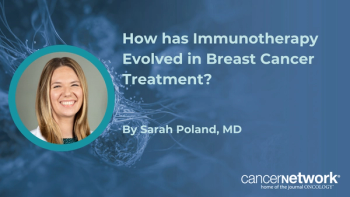
Oncology NEWS International
- Oncology NEWS International Vol 7 No 2
- Volume 7
- Issue 2
Few BRCA-1 Carriers Take Recommended Precautions
SAN ANTONIO-Genetic testing for breast cancer susceptibility appears to confer no adverse psychological effects on mutation carriers or individuals who refuse to be tested, Caryn Lerman, PhD, reported at a general session of the San Antonio Breast Cancer Symposium.
SAN ANTONIOGenetic testing for breast cancer susceptibility appears to confer no adverse psychological effects on mutation carriers or individuals who refuse to be tested, Caryn Lerman, PhD, reported at a general session of the San Antonio Breast Cancer Symposium.
The data also showed that regardless of testing or mutation status, few participants in the study, all from high-risk families, have taken advantage of prevention options or followed surveillance recommendations.
Our findings suggest that additional efforts may need to be directed toward interventions to enhance medical decision making and that there may be less need for adjuvant psychosocial interventions than initially anticipated, said Dr. Lerman, a cancer genetics specialist at the Lombardi Cancer Center and Georgetown University.
The findings come from an analysis of data on 282 men and women from 40 families with a documented history of hereditary breast/ovarian cancer. All of the individuals in the study have attended education sessions to learn more about the potential risks of hereditary breast/ovarian cancer, the availability and utility of genetic testing and counseling, the preventive options (prophylactic mas-tectomy and oophorectomy), and recommendations for follow-up screening.
Clinicians and researchers have engaged in a debate as to whether, at present, in the absence of proven prevention strategies, the psychological risks associated with genetic testing outweigh the potential medical benefits, Dr. Lerman said. So far, the debate has occurred virtually in an empirical vacuum.
In this study, funded by the Department of Defense, Dr. Lerman and her colleagues are evaluating factors that may predict an individuals decision to undergo testing for BRCA-1 gene status and to receive the test results.
The evaluation includes an assessment of the psychological impact of testing, which will be repeated 1, 6, 12, and 24 months after individuals make their initial decision about testing.
In her San Antonio presentation, Dr. Lerman reported 1- and 6-month data on depression, as evaluated by responses to a 20-item questionnaire. Each item is rated on a scale of 0 to 3, resulting in a possible cumulative score of 0 to 60, with higher scores reflecting increased levels of depression.
At each follow-up, patients are asked about preventive options and adherence to screening recommendations. For female mutation carriers who do not opt for prophylactic mastectomy or oophor-ectomy, annual mammography is recommended, as are twice-yearly trans-vaginal ultrasound scans and use of CA-125 testing.
Of the 282 individuals in the study, 192 chose to be tested, and 89 of those were found to be BRCA-1 mutation carriers. The remaining 90 people decided not to undergo genetic testing.
Minimal Depression
As a group, the participants demonstrated minimal depression, with a mean cumulative score of 9 on the depression scale, Dr. Lerman said. Within groups, no significant changes in depression scores occurred during the first 6 months of follow-up in mutation carriers, noncarriers, and those who declined testing. Noncarriers had a nonsignificant decline in depression scores.
We did not find any overall evidence for adverse effects associated with genetic testing, Dr. Lerman said. In fact, there may be some psychological benefits, at least for those individuals identified as noncarriers.
The only significant difference resulted from a comparison of 6-month depression scores for noncarriers and decliners. That difference emerged when the investigators controlled for patient age, baseline depression, and other factors shown to influence the change in depression score.
In decliners, we observed an increase in the depression score from an average of about 7 to about 12, which means they were reporting about five additional symptoms of depression over baseline or that they were endorsing two symptoms at a similar level, she said. Compared to noncarriers, this was significant.
Few unaffected (no personal history of breast cancer) mutation carriers expressed interest in prophylactic surgery. Two of 33 patients surveyed expressed a desire to have prophylactic mastectomy at baseline, but 6 months later, neither had acted on the decision.
With respect to prophylactic oophor-ectomy, 9 of 27 individuals said they intended to have the surgery, and 3 had undergone the surgery at 6 months.
At 6-month follow-up, fewer than half the mutation-carriers had undergone mammographic evaluation. About 10% had sought transvaginal ultrasound or CA-125 testing, but no patient had undergone both types of screening within the first 6 months, as recommended.
Articles in this issue
about 28 years ago
Tobacco Companies Reach Settlement With Texas for $15.3 Billionabout 28 years ago
Archives to Collect Info on Radiation Exposure Worldwideabout 28 years ago
Lifelong Weight Control a Key to Breast Ca Preventionabout 28 years ago
Eight-Year Prostate Brachytherapy Update Shows Good Resultsabout 28 years ago
Patient Brochure on Breast Cancer Tumor Markersabout 28 years ago
Gay Men’s Health Crisis Calls for HIV Reporting in New Yorkabout 28 years ago
Single-Agent Taxanes in Advanced Breast Cancer: A Commentaryabout 28 years ago
ODAC Declines to Vote on DepoCyt FDA Recommendationabout 28 years ago
Photofrin Approved for Early-Stage Lung Cancerabout 28 years ago
Breast Cancer Diagnosed After Childbirth May Be More SevereNewsletter
Stay up to date on recent advances in the multidisciplinary approach to cancer.















































